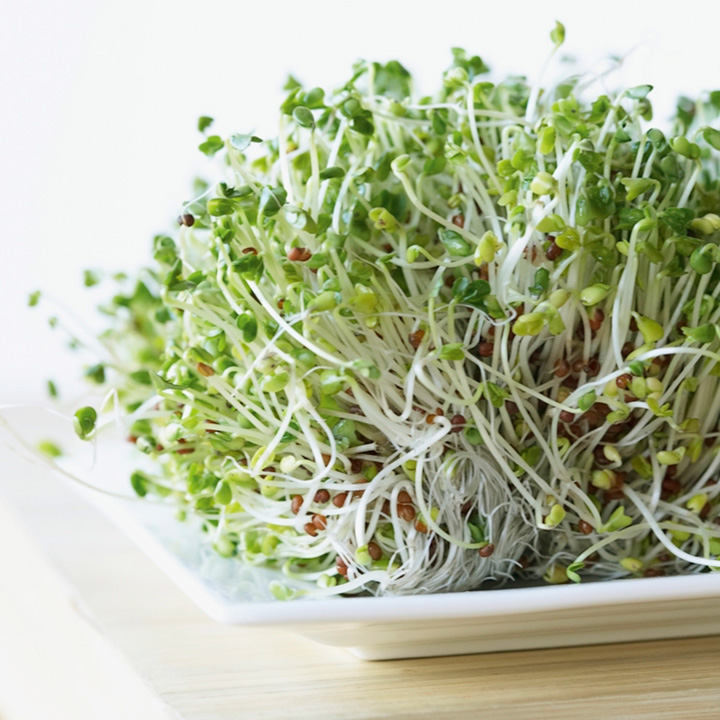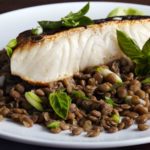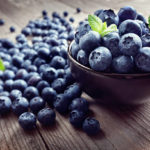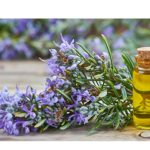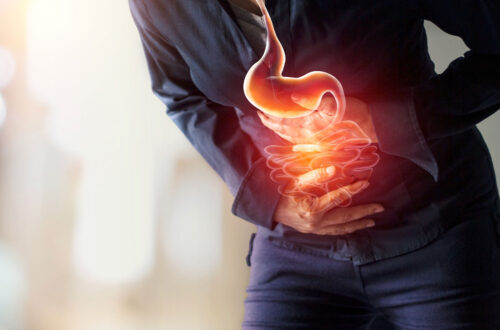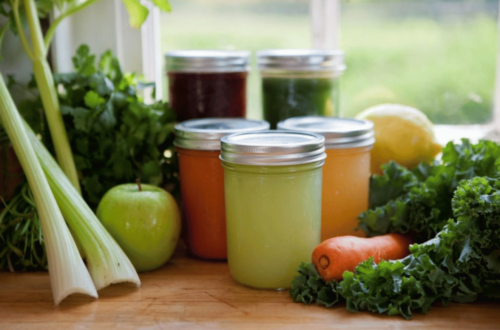Alfalfa Sprouts Benefits to Health
It is noteworthy that alfalfa sprouts benefits span from being one of the foods for the blood to being a little appreciated food of enormous value. You should find out why.
Many may have regarded alfalfa as an inferior food since it is used as animal feed but current findings have it that alfalfa sprouts benefits are seen and confirmed to be of great value to health because it is among the most nutritious of plant-based foods.
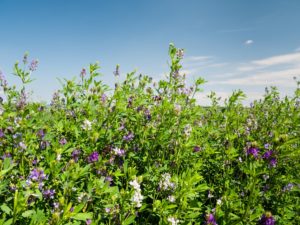
Did you know that feeding alfalfa sprouts to chickens that may have been suffering from bleeding will definitely put a stop to the bleeding or hemorrhage? A Danish scientist discovered alfalfa sprouts benefits when he used it on his chickens as suggested by one of his students.
In the 1939, anti-hemorrhagic substance was discovered in alfalfa and then isolated and identified. There, it was named phylloquinone, phytonadione or Vitamin K.
Other names: Lucerna, Sativa
French: Luzerne
Spanish: Alfalfa
German: Luzerne
Alfalfa Description
The leaves, sprouts and the seeds of the plant (‘Medicago sativa’ L), is an herbaceous plant that belongs the botanical family Leguminosea. Alfalfa plant is native to the land of Medes which is related to ancient Assyria. The cultivation of this plant has spread from the Middle East throughout the entire world especially in temperate regions.
The vitamin K or phytonadione in alfalfa is a vegetable substance which is quite abundant in alfalfa and other leafy green vegetables. It is not absorbed as expected if fat is found lacking in the diet because it is fat soluble.
However, in Dam’s experiment the presence of vitamin K in alfalfa compensated for the low absorption caused by the fat lacking in the diet, and this vitamin K solved the problem of the deficiency disease.
SEE ALSO: Foods to avoid with Kidney Failure
Alfalfa Seeds, Sprouted Composition
Per 100 grams of alfalfa sprouts
Energy = 29.0 kcal = 121 kj
Fiber = 2.50 g
Carbohydrates = 1.28 g
Protein = 3.99 g
Vitamin A = 16.0 µg RE
Vitamin B1 = 0.076 mg
Vitamin B2 = 0.126 mg
Niacin = 0.481 mg NE
Vitamin B6 = 0.034 mg
Folate = 36.0 µg
Vitamin B12 = ___
Vitamin C = 8.20 mg
Vitamin E = 0.020 mg α-TE
Calcium = 32.0 mg
Iron = 0.960 mg
Phosphorus = 70.0 mg
Potassium = 79.0 mg
Magnesium = 27.0 mg
Zinc = 0.920 mg
Saturated Fat = 0.069 g
Total Fat = 0.690 g
Cholesterol = ___
Sodium = 6.00 mg
This is based on % daily value provided by 100 grams of alfalfa
The above information and the one below are based according to information provided by Dr, George D. Pamplona in his book “Encyclopedia of Foods and their healing properties”.
Alfalfa Seed, Sprouted Percentage Composition
Fiber = 2.50%
Carbohydrates = 1.28%
Fat = 0.690%
Minerals = 0.400%
Protein = 3.99%
Water = 91.1%
YOU MAY LIKE:Benefits of Eating Apricot
Alfalfa Sprouts Benefits and Indications
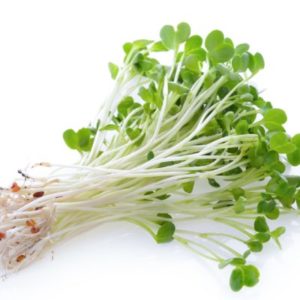
Alfalfa sprouts contain a wide range of vitamins and minerals; particularly and highly rich in vitamins C and E and folic acid, as well as calcium, proteins and iron. Alfalfa leaves also contains the above mentioned components but to a lesser degree.
It is said that alfalfa nutritional value is somewhat greater than most of plants-based foods and this could be the reason that horses fed on alfalfa do greatly in races.
This beautiful plant of great value has enormous dietary and therapeutic value and properties to health which are indicated below.
- Anti-anemic
- Anti-hemorrhagic
- Remineralization
- Digestive properties
- Cholesterol reduction
Anti-anemic
One of the alfalfa sprouts benefits is the vitamin C in it which helps to enhance the absorption of iron from vegetable sources. Alfalfa sprouts contain up to 1 mg of iron per 100 grams. This percentage is sufficient to support red blood cell production.
Alfalfa contains other minerals however, in small amounts such as copper and boron. Alfalfa sprouts benefits are also seen in its vitamins that combine with the minerals to have an anti-anemic effect.
Therefore, we can say that alfalfa sprouts benefits are maximized in cases of iron deficiency anemia, physical exhaustion and also undernourishment.
Antihemorrhagic
In alfalfa, there is presence of about 300 to 400 µg (micrograms) of vitamin K per 100 grams. This amount has surpassed the one of meat or even milk which is 7 µg and 3.5 respectively.
Vitamin K is needed and quite essential for the production of prothrombin by the liver and other components and factors involved in blood clotting.
When on oral antibiotics or in cases of digestive disorders, the intestinal flora seems tampered with thereby reducing the bacteria that enhances the production of vitamin K. When this takes place, the body will only depend on the dietary sources of this vitamin.
Therefore, to take advantage of alfalfa sprouts benefits, it highly recommended to consume its sprouts.
Remineralization
Another one among the alfalfa sprouts benefits is the fact that the vitamin K which is in abundance in alfalfa helps improve calcium utilization precisely in the bones. In essence, the presence of vitamin K potentiate the action of anti-rickets of vitamin D.
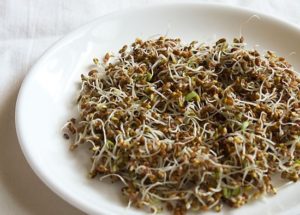
Alfalfa sprouts make available calcium, magnesium and phosphorus and therefore recommended in cases of osteoporosis, rickets, and arthrosis. This is its effect on bone metabolism which is quite beneficial.
With regular consumption of alfalfa which may be taken as an infusion of alfalfa seeds, those suffering from rheumatism and arthritis will see improvements.
Digestive properties
It is found that alfalfa sprouts hold many enzymes such as protease and amylase which facilitate the proper gas-free digestion and free from abdominal heaviness.
Cholesterol reduction

This effects this plant exert regarding cholesterol is one of the alfalfa sprouts benefits. Alfalfa sprouts reduce cholesterol level in the liver and also in the blood. This effect is of alfalfa saponins.
Generally, there’s been a good result especially in cases of exhaustion and depression through frequent alfalfa sprouts consumption.
Preparation and Use
- Alfalfa sprouts are enjoyed raw in sandwiches and salads
- Alfalfa seeds are prepared and used to make infusion. A soupspoon of seeds is added to a liter of water. Drink 2 to 3 glasses every daily.
- Alfalfa leaves: The younger leaves may be eaten raw in salads. They are cooked, much as spinach, in soups, croquette and omelets.
One good thing I like about alfalfa sprouts is that it is easy to digest and according to medicinenet.com, it can help build the immune system.
Warning!
People suffering from lupus erythematosus or other autoimmune diseases should not take alfalfa because the amino acid I-canavanine in alfalfa can aggravate autoimmune reactions in the body.
Foods to help with Constipation

A graduate of Computer Science and Information Management Technology. Diploma – Caregiving, Certificates – Dementia and Diabetes Awareness and Management. A researcher, blogger, songwriter, singer and acoustic guitarist. Born in an environment where natural talents such as healing are imparted at our natural birth. This natural talents of healing is the result of our genetic inheritance and the training from family environment.

